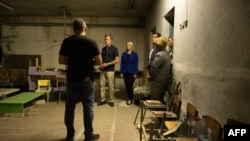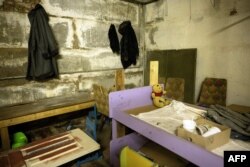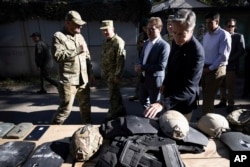U.S. Secretary of State Antony Blinken on Thursday wrapped up the second day of his visit to Ukraine, saying he was struck by the horrific human cost of Russia's aggression there.
After touring the Yahidne School — a former elementary school whose basement held Ukrainian hostages during Russia's occupation of that village and has since been converted into a museum — Blinken said seeing the small room where people were tortured gave the war's casualty figures a human dimension.
"It all comes down to ... the lives, the stories of men of women and children … who were in prison in the basement of this building next to us, which normally was a school, and were held there for a month — 127 people in a room not even fit for one person for human habitation," he said during an interview with NBC News.
Blinken said although what happened in the school, located a 90-minute drive northeast of Kyiv, is just one example of Russian atrocities occurring across Ukraine, he also witnessed the extraordinary resilience of the Ukrainian people, who are quietly rebuilding in Yahidne and wherever else they can.
Blinken told NBC it is Russian President Vladimir Putin who needs to come to terms with the fact that he has lost the war and must come to the negotiating table.
Russia blames the United States and NATO for prolonging the war by supporting Ukraine.
Earlier Thursday, Blinken visited a Ukrainian border guard site on the outskirts of Kyiv, where he presented four mine-resistant ambush-protected vehicles that are part of 190 the U.S. will be delivering in coming months. Blinken also visited a hydroelectric dam and met with a Ukrainian team working to clear unexploded Russian ordnance at a farm where corn was grown for export.
"What's hard to get our minds around is that one third of Ukrainian territory has mines or unexploded ordnance on it," Blinken said.
"Your work is having a profound impact on the lives of Ukrainians and on people around the world," he said, noting Ukraine's importance to global food supplies.
New aid package
On Wednesday, Blinken announced $1 billion in new U.S. aid for Ukraine, with $175 million in security aid that includes additional air defense equipment, artillery munitions, anti-tank weapons including depleted uranium rounds for previously committed Abrams tanks, and other equipment.
Asked whether he is concerned about sustaining support for that level of U.S. aid among American citizens and lawmakers, Blinken was optimistic.
"I was last here almost exactly a year ago," he said. "And in that time, in the year since I was last here, Ukraine has taken back more than 50% of the territory that Russia has seized from it since February 2022. In the current counteroffensive, we are seeing real progress over the last few weeks."
Ukrainian Foreign Affairs Minister Dmytro Kuleba said what is being decided in this war is not just about Ukraine, but about what the world is going to look like after the war is over. If Russia wins, other autocrats will be empowered to invade their neighbors, he said, asking, "If the West cannot win this war, what war can they win?"
However, on Capitol Hill, one Republican senator expressed concerns to VOA, saying he would like to see a definitive strategy from the Biden administration for Ukraine to win the war.
"I'd like to see an announcement coming from all the NATO members saying that they are willing to step up. … I just got back from a trip to Europe, and we encouraged our NATO allies to actually step up their game, and I would like to see that happen," said Senator Bill Hagerty of Tennessee, a member of the Foreign Relations Committee.
The United States is the largest donor of military aid to Ukraine in total dollars. Other countries, including Denmark, Estonia, Latvia, Lithuania, Poland, Slovakia, Norway, Finland, the Netherlands, the United Kingdom and the Czech Republic, are making larger financial contributions to Ukraine relative to the size of their own economies, according to the Kiel Institute for the World Economy in Germany.
Some information in this report was provided by VOA congressional correspondent Katherine Gypson.






